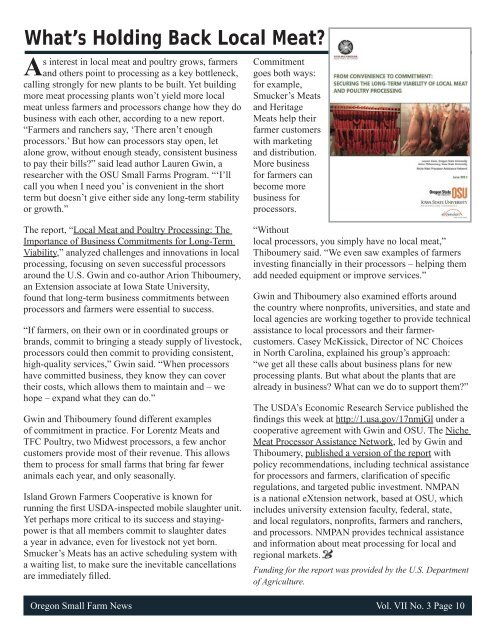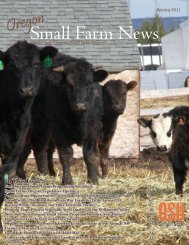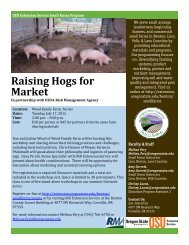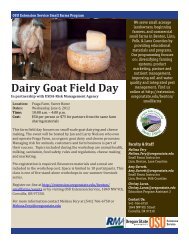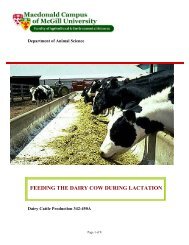Small Farm News - Oregon Small Farms - Oregon State University
Small Farm News - Oregon Small Farms - Oregon State University
Small Farm News - Oregon Small Farms - Oregon State University
Create successful ePaper yourself
Turn your PDF publications into a flip-book with our unique Google optimized e-Paper software.
What’s Holding Back Local Meat<br />
As interest in local meat and poultry grows, farmers<br />
and others point to processing as a key bottleneck,<br />
calling strongly for new plants to be built. Yet building<br />
more meat processing plants won’t yield more local<br />
meat unless farmers and processors change how they do<br />
business with each other, according to a new report.<br />
“<strong>Farm</strong>ers and ranchers say, ‘There aren’t enough<br />
processors.’ But how can processors stay open, let<br />
alone grow, without enough steady, consistent business<br />
to pay their bills” said lead author Lauren Gwin, a<br />
researcher with the OSU <strong>Small</strong> <strong>Farm</strong>s Program. “‘I’ll<br />
call you when I need you’ is convenient in the short<br />
term but doesn’t give either side any long-term stability<br />
or growth.”<br />
Commitment<br />
goes both ways:<br />
for example,<br />
Smucker’s Meats<br />
and Heritage<br />
Meats help their<br />
farmer customers<br />
with marketing<br />
and distribution.<br />
More business<br />
for farmers can<br />
become more<br />
business for<br />
processors.<br />
The report, “Local Meat and Poultry Processing: The<br />
Importance of Business Commitments for Long-Term<br />
Viability,” analyzed challenges and innovations in local<br />
processing, focusing on seven successful processors<br />
around the U.S. Gwin and co-author Arion Thiboumery,<br />
an Extension associate at Iowa <strong>State</strong> <strong>University</strong>,<br />
found that long-term business commitments between<br />
processors and farmers were essential to success.<br />
“If farmers, on their own or in coordinated groups or<br />
brands, commit to bringing a steady supply of livestock,<br />
processors could then commit to providing consistent,<br />
high-quality services,” Gwin said. “When processors<br />
have committed business, they know they can cover<br />
their costs, which allows them to maintain and – we<br />
hope – expand what they can do.”<br />
Gwin and Thiboumery found different examples<br />
of commitment in practice. For Lorentz Meats and<br />
TFC Poultry, two Midwest processors, a few anchor<br />
customers provide most of their revenue. This allows<br />
them to process for small farms that bring far fewer<br />
animals each year, and only seasonally.<br />
Island Grown <strong>Farm</strong>ers Cooperative is known for<br />
running the first USDA-inspected mobile slaughter unit.<br />
Yet perhaps more critical to its success and stayingpower<br />
is that all members commit to slaughter dates<br />
a year in advance, even for livestock not yet born.<br />
Smucker’s Meats has an active scheduling system with<br />
a waiting list, to make sure the inevitable cancellations<br />
are immediately filled.<br />
“Without<br />
local processors, you simply have no local meat,”<br />
Thiboumery said. “We even saw examples of farmers<br />
investing financially in their processors – helping them<br />
add needed equipment or improve services.”<br />
Gwin and Thiboumery also examined efforts around<br />
the country where nonprofits, universities, and state and<br />
local agencies are working together to provide technical<br />
assistance to local processors and their farmercustomers.<br />
Casey McKissick, Director of NC Choices<br />
in North Carolina, explained his group’s approach:<br />
“we get all these calls about business plans for new<br />
processing plants. But what about the plants that are<br />
already in business What can we do to support them”<br />
The USDA’s Economic Research Service published the<br />
findings this week at http://1.usa.gov/17nmjGl under a<br />
cooperative agreement with Gwin and OSU. The Niche<br />
Meat Processor Assistance Network, led by Gwin and<br />
Thiboumery, published a version of the report with<br />
policy recommendations, including technical assistance<br />
for processors and farmers, clarification of specific<br />
regulations, and targeted public investment. NMPAN<br />
is a national eXtension network, based at OSU, which<br />
includes university extension faculty, federal, state,<br />
and local regulators, nonprofits, farmers and ranchers,<br />
and processors. NMPAN provides technical assistance<br />
and information about meat processing for local and<br />
regional markets.<br />
Funding for the report was provided by the U.S. Department<br />
of Agriculture.<br />
<strong>Oregon</strong> <strong>Small</strong> <strong>Farm</strong> <strong>News</strong> Vol. VII No. 3 Page 10


